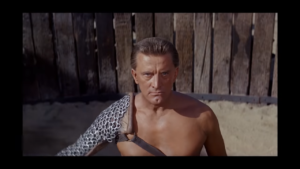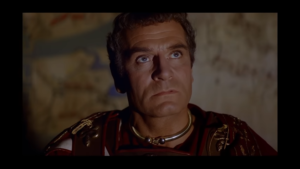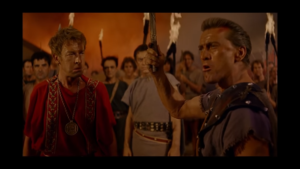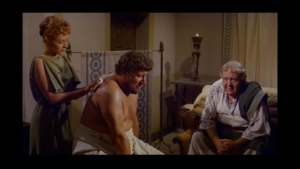Rating: 4.5 out of 5




![]()
Roman history is straight-up fascinating. The Roman Empire was one of the biggest and strongest empires in history. The Roman Empire included extensive territorial holdings around the Mediterranean Sea in Europe, North Africa, and Western Asia and was ruled by emperors. Even though Julius Caesar was never an emperor, he was a straight-up beast. Rome was the capital and one of the most influential places throughout history.

During that time, Spartacus was a rebel. Spartacus was a Thracian gladiator who escaped slavery and was one of the major leaders in the Third Servile War. The Third Servile War was a major slave uprising against the Roman Republic. Only a little history or accounts are written about Spartacus. Still, few have stated he was a military warrior who won a few decisive battles in his quest for freedom.
Spartacus is a film directed by Stanley Kubrick, written by Dalton Trumbo, and based on the 1951 novel of the same title by Howard Fast. In the first century BC, the Roman Republic is on the verge of being the greatest empire. Spartacus (Douglas) is a rebellious slave purchased by Lentulus Batiatus (Sir Ustinov), owner of a gladiator school. Spartacus is trained to be a gladiator and for the entertainment of one of the most influential senators in Rome, Roman Senator Marcus Licinius Crassus (Sir Olivier). Crassus is a corrupt senator who has a powerful voice in the Senate. Crassus comes to the school for entertainment and stages a fight to the death. The night before, enslaved trainees are rewarded with female companionship Spartacus’ companion for the evening is Varinia (Simmons), a fine-ass slave from Britannia. Crassus takes a major liking to Varinia and buys her. During a fight between Spartacus and another slave, the slave tries to attack Crassus, only to be killed. When Spartacus learns that Varinia has been sold to Crassus, he leads his fellow gladiators in a revolt. Soon, word spreads, and Spartacus frees many slaves. The Roman Republic viewed this as a minor revolt and sent a small army to stop it. Spartacus crushes the army and is reconnected with Varinia. The pair fall madly in love with each other. As the revolt wages on, a political struggle soon erupts between the two most powerful Roman Senators, Crassus, and a more temperate Senator named Gracchus (Laughton). Will Spartacus lead slaves to freedom or fall?

Spartacus is a phenomenal film. If you took world history, you might have briefly gone over Spartacus. I thought the story of Spartacus happened towards the end of the Roman empire, but based on the film, it happened before there was a Roman empire, and Julius Caesar was just a young buck.
The plot is told from two different views: Spartacus’s rise and quest for freedom and the Roman Senate’s quest to stop him. Spartacus’s story was one of freedom. All he wanted was to be free. He was sold to another and taught to be a gladiator. This is where Spartacus and Crassus meet for the first time, but that part is where another slave dies. When Spartacus saw his woman be sold, he hit that aww hell naw! Seeing him revolt is quite entertaining and powerful. During his quest, he seems righteous, telling the other slaves not to kill the owners. This scene was greatly shown when his men captured another slave place, and the two owners had to fight to the death. He stopped it and gave a speech about not being like them. Spartacus also saw the importance of women. When that one old lady told him off, it was funny but also true. When Spartacus defeated Crassus homeboy, the Senate became serious because the Roman republic was like naw, we got to send everyone and anyone because slaves are meant to serve.
This brings us to the other side of the story. The Roman Senate was straight-up trifling and corrupt. Crassus was the most influential senator as he was wealthy and had a military genius behind him. Crassus would do anything for power and the goal of becoming a dictator. He even put his homeboy in charge of a legion of protecting the republic. Crassus has his own enemies, and the main one is Gracchus. You can tell that Gracchus and Crassus can’t stand each other. These two bicker and poke at each other every chance they get. When Crassus’s homeboy fell, Gracchus was there to promote the young Julius Caesar to have more military power and somewhat exiled Crassus. When Spartacus seemed to continue his wins, the Senate asked Crassus to return. Homeboy asks for the entire farm in negotiations and gets the power he craves. It was all trifling and fun to watch.

The two stories collide towards the end when Spartacus asks pirates to help him, and his people escape. Things go well until Crassus bribes them to keep Spartacus and his army in a specific location. Crassus send everything at Spartacus with three different legions from three different locations to descend upon the mighty former slave. When Spartacus’s forces were defeated and slaughtered, the captured men gave the famous “I’m Spartacus!” line. Crassus decides to crucifix every survivor along the roads. Straight up tough right there.
The story also has that love part. Spartacus and Varinia fall in love with each other. Varinia becomes Spartacus’s informal wife, and she soon tells them she is with child. You hope Spartacus can survive, but in the end, you don’t think it will happen. Crassus also has fallen in love with Varinia. After Spartacus’s defeat, he takes her and her child in. Crassus would give Varinia everything, but she doesn’t want jack shit from him. It was telling that she dipped from him with her child with Gracchus’s help. It was one last touching moment when Spartacus got to see his child as he hung on the cross.
The film excels in cinematography. I swear that these epic films know how to show everything in grand ways. Before CGI, you employed thousands of people to show how large an army is. You saw how wide and vast Spartacus’s followers were when they went from place to place and took up the mighty plains. The camera work also did great work when it came to the fighting at the end. It showed everything from fighting to marching. It was a great view of what a major fight looked like back in the day.

The cast was the strongest part of the film. I was surprised Kirk Douglas didn’t win the Academy Award. He was great as a slave who turned into a leader. He had a strong presence but also a kind side. Douglas commanded the screen when he was on and seemed to be one with this role.
Laurence Olivier as Crassus was equal to Douglas. As Crassus, homeboy was manipulative and also ambitious. He showed Crassus’s lust for power and did everything to ensure he got it. Peter Ustinov as Batiatus was funny and entertaining. I don’t know how he won the Academy Award for Best Supporting Actor. He was funny, but there were far stronger candidates from this film that could’ve won the award. He was really in the beginning and end of the film. Charles Laughton as Gracchus was a straight-up gangsta in this film. I loved how he irritated Crassus. He did it in such a calm and eloquent way. I have to give it up to Laughton, every movie I see him in, I know I will get an outstanding performance.
Jean Simmons as Varinia was meh. She was beautiful, but she didn’t seem to have any strong emotions. She seemed to simply smile and sometimes get angry. To me, she was the down part of the whole acting cast.
Spartacus is a fantastic film that is grand and has a great story. I don’t know if it is historically accurate. Still, it gives you a view of Roman politics and some significant historical figures that would become popular throughout history. Douglas, Olivier, Laughton, and Ustinov did a great job with their performances. When you need a history movie, watch this one because “I’m Spartacus!”